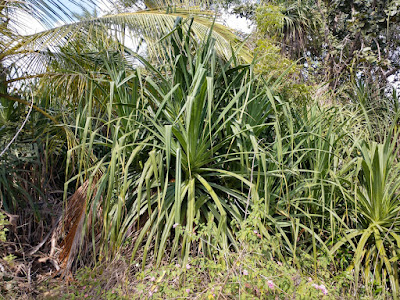During the fourth visit to Bhogasandra, somehow the matter of Taalegari Lipi came into one of the evening chats. Sridhar mentioned that they had some Taalegari strips at home. I think it was our friend Siddaramanna who mentioned about Taalegeri plants close to Sridhar's land. Being a rare plant people from far away places come in search of its flowers during Aug - Sept months which happens to be Hindu festive season. The flower has a unique form and fragrant, it is used as an offering to religious idols at home and temples. A decade ago I'd seen a Taalegari plant in the forest path on the way to Sirle waterfall near Yellapur in Uttara Kannada district. After some discussion with Siddaramanna it was clear that the plant seen near Sirle and the ones here were two different plants. So it's not just one type of leaf was used to make writing medium, different leaves were used. Probably the leaves of Tati Nungu (toddy palm or ice apple) were also used as writing medium. I eagerly waited for daybreak to take a look at the Taale plants here.
The following morning another friend Shivappa showed me the plants which I remember seeing earlier but I'd not paid attention to them. These plants were present along the banks of the stream. Some of the plants are rooted in the streambed itself. Basically this plant requires high moisture hence grows along rivers and streams, maybe near ponds as well.
Taale is also known as Kewda plant and Fragrant Screw Pine. Taale leaves are long-pointed, dark green, has barbs along the edges. The leaves emerge from the stem like a fountain. Each clump could have 100 to 120 leaves. A mature leaf can be a meter long i.e. about 3' feet. A single plant can have several branches and grows up to 15' tall.
As per my observation, there are 8 to 10 clusters, each cluster comprising of 5 to 6 plants. These plants flower between July and September. The flowers transform into fruits which resemble small pineapples when raw. On ripening, they turn bright orange. Apparently the screw pine is edible but it must be cooked and eaten.
We managed to get close to one of the plants which was reachable to our hands. Luckily Shivappa had a kudlu, a long sickle with which he cut a bunch of young leaves. Carrying the bunch from here to the farmhouse was something. I'd hold it up with my arm stretched out fully so that the thorny edges don't tear into my skin or clothes.
This is the bunch I go home and placed in a water filled pot. That was an attempt to keep it fresh for a day. Leaves could be peeled out easily since their bases formed a cylindrical stack. That gave me an idea of the leaves were separated, then dried out. However, to make them a long lasting writing medium, there must be a an elaborate procedure starting with removing the thorns.
Hoping to see a flowered plant this August or September. Or I can ask one of our friends to check out the plant and take pictures of flowers and fruits.





شكراً لك على المعلومات القيمة حول السياحة!
ReplyDeleteThank you!
Delete